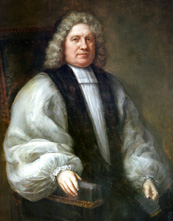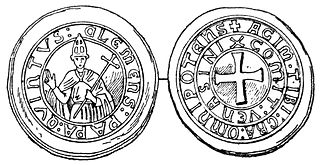Contents
| |||||
| Centuries: | |||||
|---|---|---|---|---|---|
| Decades: | |||||
| See also: | Other events of 1511 List of years in Ireland | ||||
Events from the year 1511 in Ireland.
| |||||
| Centuries: | |||||
|---|---|---|---|---|---|
| Decades: | |||||
| See also: | Other events of 1511 List of years in Ireland | ||||
Events from the year 1511 in Ireland.

James Ussher was the Church of Ireland Archbishop of Armagh and Primate of All Ireland between 1625 and 1656. He was a prolific Irish scholar and church leader, who today is most famous for his identification of the genuine letters of the church father, Ignatius of Antioch, and for his chronology that sought to establish the time and date of the creation as "the entrance of the night preceding the 23rd day of October... the year before Christ 4004"; that is, around 6 pm on 22 October 4004 BC, per the proleptic Julian calendar.
The Lord High Chancellor of Ireland was the highest judicial office in Ireland until the establishment of the Irish Free State in 1922. From 1721 to the end of 1800, it was also the highest political office of the Irish Parliament: the Chancellor was Speaker of the Irish House of Lords. The Lord Chancellor was also Lord Keeper of the Great Seal of Ireland. In all three respects, the office mirrored the Lord High Chancellor of Great Britain.

Narcissus Marsh was an English clergyman who was successively Church of Ireland Bishop of Ferns and Leighlin, Archbishop of Cashel, Archbishop of Dublin and Archbishop of Armagh. He also served as the 13th Provost of Trinity College Dublin from 1679 to 1683.
Sir James OrmondaliasButler was the son of John Butler, 6th Earl of Ormond. He was Lord Treasurer of Ireland from 1492 to 1494, and helped to defend the Lordship of Ireland against the forces of Perkin Warbeck. He was murdered by Sir Piers Butler on 17 July 1497. Piers would later hold the title of Earl of Ormond.
Hugh Curwen was an English ecclesiastic and statesman, who served as Archbishop of Dublin and Lord Chancellor of Ireland from 1555 to 1567, then as Bishop of Oxford until his death in November 1568.
John Ryder (1562–1632) was a lexicographer who published an English-Latin Dictionary that was widely used in the 17th century. A favourite of Elizabeth I, he was Dean of St. Patrick's Cathedral, Dublin, and the Anglican Bishop of Killaloe.
Events from the year 1566 in Ireland.
Events from the year 1492 in Ireland.
James Stanihurst, also spelt James Stanyhurst) was for three terms Speaker of the Irish House of Commons. He was also the first judge to hold the position of Recorder of Dublin.

Henry Ussher was an Irish Protestant churchman, a founder of Trinity College Dublin, and Church of Ireland Archbishop of Armagh.
Nicholas St Lawrence, 4th Baron Howth was a leading Irish nobleman, soldier and statesman of the early Tudor period, who held the office of Lord Chancellor of Ireland.
Walter Fitzsimon or Fitzsimons was a statesman and cleric in Ireland in the reign of Henry VII, who held the offices of Archbishop of Dublin and Lord Chancellor of Ireland.
William Rokeby was a leading statesman and cleric in early sixteenth-century Ireland, who held the offices of Bishop of Meath, Archbishop of Dublin and Lord Chancellor of Ireland. He is commemorated in the Rokeby Chapels in two Yorkshire churches, St Oswald's Church, Kirk Sandall, and Halifax Minster.
Hugh Inge or Ynge(c. 1460 – 3 August 1528) was an English-born judge and prelate in sixteenth century Ireland who held the offices of Bishop of Meath, Archbishop of Dublin and Lord Chancellor of Ireland.
John Carpenter, was an Irish Catholic prelate who served as Archbishop of Dublin from 1770 until death in 1786.
Fitzsimon is a surname. Notable people with the surname include:
Edward Fitz-Symon was a leading Irish barrister and judge of the Elizabethan era. He held the offices of Attorney General for Ireland and Serjeant-at-law (Ireland) and was very briefly Master of the Rolls in Ireland. Despite his appointment to these senior offices, he was derided by his contemporaries as being a man of "mean learning". His family were Lords of the Manor of Baldoyle for several generations.
Events from the year 1605 in Ireland.
Events from the year 1484 in Ireland.

The medieval University of Dublin was an early unsuccessful attempt to establish a university in Dublin, the capital city of the Lordship of Ireland. Founded in 1320, it maintained an intermittent existence for the next two centuries, but it never flourished, and disappeared for good at the Reformation in Ireland (1534–41). It was located in Saint Patrick's Cathedral, Dublin. It had no connection with the present University of Dublin, better known as Trinity College Dublin, which was founded in 1592.